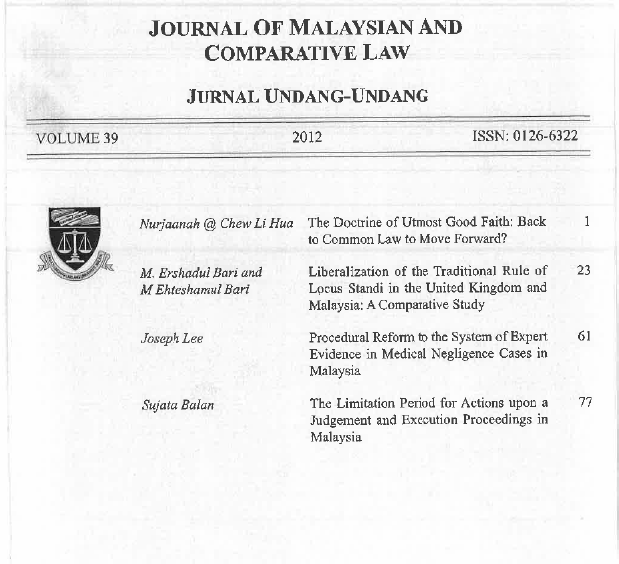Liberalization of the Traditional Rule of Locus Standi in the United Kingdom and Malaysia
A Comparative Study
Abstract
The classical and restrictive rule of locus standi, which is inherent in all legal systems, is aimed at to limit the access of the citizen to the court of law by insisting that only a ‘person aggrieved’ can maintain an action seeking remedy for the violation of the public or private rights so that wasteful challenges by busybodies can be excluded and limited judicial resources are not being misused. In the United Kingdom, Lord Denning MR in a series of epoch-making decisions in Blackburn’s cases, given mainly in the early 1970s, broadened the ambit of access to justice by evolving the concept of ‘sufficient interest’ in place of ‘aggrieved person’. The liberalizing approach to the rule of locus standi was ultimately approved in 1977 in a new Order 53 of the Supreme Court Rules by stipulating a common standing test of ‘sufficient interest in the matter’ to which the application for judicial review relates. This neo ‘sufficient interest’ test has received a more progressive interpretations by the superior courts of the United Kingdom to allow access to judicial review not only to a particular applicant for himself but also to three other types of applicants claiming surrogate, associational or citizen standing from the realization that the possibility of instituting such applications challenging the illegalities of the executive or a public authority will induce the authority concerned to act with greater responsibility which will have the effect of maintaining the rule of law and furthering the cause of justice. But in the common law country of Malaysia, the liberalization issue of locus standi, set in motion in early 1980s in the cases of Lim Cho Hock, Mohamed bin Ismail and Tan Sri Haji Othman Saat, was held back by the then Supreme Court of the country in 1988 in the UEM case maintaining restrictive approach towards locus standi in public law which is in somewhat out of tune with the change taken place in this regard in other jurisdictions notably in the United Kingdom. It was not kept in mind that the liberalization of the rules of standing over the years in various jurisdictions owes essentially to the creative and innovative interpretation of the few outstanding judges. Therefore, it has been proposed that the apex court of Malaysia should reconsider its conservative stance in an appropriate case for stretching the standing rule to enable a public spirited individual acting bona fide to institute an action for judicial redress of a public wrong or injury so that the executive or public authority can be kept on its toes and public laws are not violated with impunity.
Downloads



